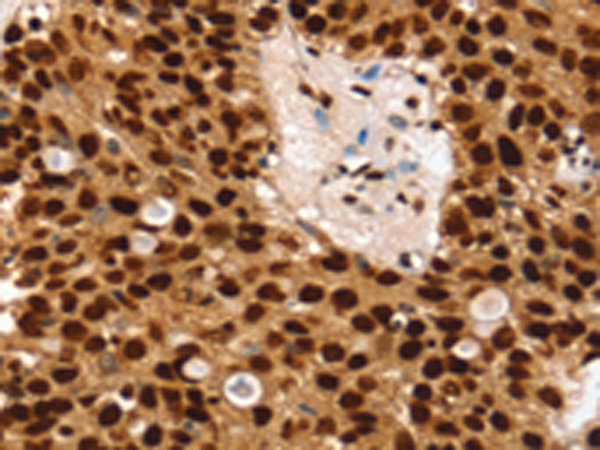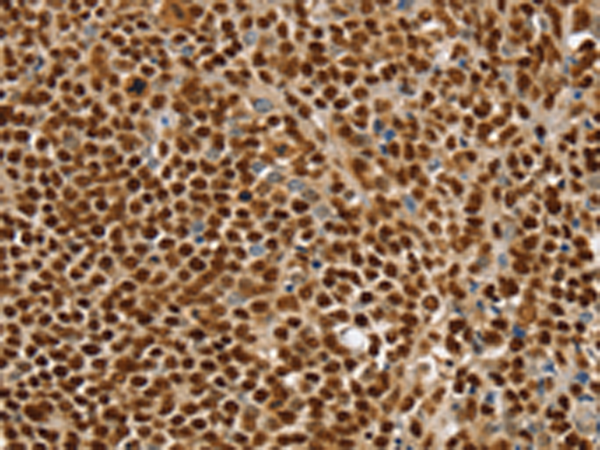


| WB | 咨询技术 | Human,Mouse,Rat |
| IF | 咨询技术 | Human,Mouse,Rat |
| IHC | 1/25-1/100 | Human,Mouse,Rat |
| ICC | 技术咨询 | Human,Mouse,Rat |
| FCM | 咨询技术 | Human,Mouse,Rat |
| Elisa | 1/2000-1/5000 | Human,Mouse,Rat |
| Aliases | La; LARP3; La/SSB |
| WB Predicted band size | 47 kDa |
| Host/Isotype | Rabbit IgG |
| Antibody Type | Primary antibody |
| Storage | Store at 4°C short term. Aliquot and store at -20°C long term. Avoid freeze/thaw cycles. |
| Species Reactivity | Human |
| Immunogen | Synthetic peptide of human SSB |
| Formulation | Purified antibody in PBS with 0.05% sodium azide and 50% glycerol. |
+ +
以下是关于SSB抗体的3篇代表性文献的简要信息:
1. **"Anti-La (SSB) autoantibodies: structural insights and diagnostic implications"**
- **作者**: Harley, J.B., et al.
- **摘要**: 该研究系统分析了SSB抗体的临床意义,发现其与干燥综合征(Sjögren's syndrome)和系统性红斑狼疮(SLE)高度相关,并探讨了其作为特异性血清学标志物在疾病诊断中的应用价值。
2. **"Molecular characterization of the Ro/SSA-La/SSB system: a link between autoantigens and maternal fetal autoimmunity"**
- **作者**: Hendrick, J.P., et al.
- **摘要**: 研究揭示了SSB(La)蛋白的分子结构及其与RNA结合的生物学功能,提出SSB抗体可能通过干扰RNA代谢通路参与自身免疫反应的机制,尤其在新生儿狼疮中的作用。
3. **"Epitope mapping of the SSB/La antigen reveals distinct antibody profiles in systemic autoimmune diseases"**
- **作者**: Routsias, J.G., et al.
- **摘要**: 通过表位定位技术,发现SSB抗原的不同区域在干燥综合征、SLE等疾病中触发特异性抗体反应,为疾病分型和个性化诊断提供了分子基础。
4. **"Clinical utility of anti-SSB antibodies in primary Sjögren's syndrome"**
- **作者**: Baudino, L., et al.
- **摘要**: 临床研究表明,SSB抗体与干燥综合征患者唾液腺损伤程度和疾病活动性相关,强调了其在评估预后及制定治疗方案中的潜在作用。
以上文献涵盖SSB抗体的分子机制、表位特征及临床应用,可作为相关研究的参考。
SSB antibodies, also known as anti-La antibodies, are autoantibodies targeting the SSB (Sjögren syndrome type B) antigen, a 48-kDa RNA-binding protein involved in RNA polymerase III transcription termination and RNA processing. These antibodies are closely associated with autoimmune disorders, particularly Sjögren's syndrome (SS) and systemic lupus erythematosus (SLE). SSB is often co-expressed with SSA/Ro antibodies, forming a serological hallmark of SS, where their presence correlates with glandular dysfunction (e.g., dry eyes/mouth) and extraglandular manifestations. In SLE, SSB antibodies are linked to photosensitivity, cutaneous vasculitis, and milder renal involvement.
The SSB antigen interacts with small RNA molecules, including Y RNAs and viral transcripts, suggesting roles in RNA quality control and antiviral responses. Autoimmunity against SSB may arise from molecular mimicry, apoptosis-induced exposure of intracellular antigens, or dysregulated tolerance mechanisms.
Clinically, SSB antibodies are detected via ELISA, immunoblot, or line immunoassay. While less common than SSA antibodies, their specificity for SS is higher when paired with SSA. Isolated SSB positivity is rare. These antibodies also hold prognostic value; in pregnant women with SSA/SSB antibodies, fetal exposure increases neonatal lupus risk, particularly congenital heart block. Research continues to explore their pathogenic role, including potential contributions to interferon pathway activation and epitope-specific immune responses. Their detection aids in disease classification and informs clinical monitoring strategies.
×